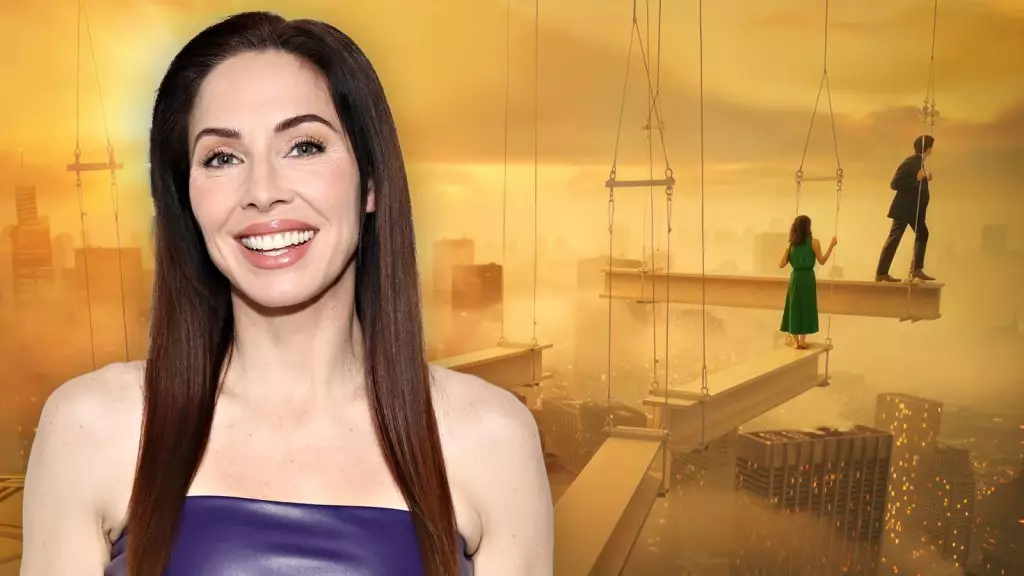Whitney Cummings, a prominent figure in the comedy scene, has recently opened up about her audition for the much-anticipated science fiction film Megalopolis, directed by the legendary Francis Ford Coppola. While many would perceive such an opportunity as a career milestone, Cummings reflects on the experience with a sense of horror and embarrassment. The contrast between the glamorous illusion of Hollywood and the brutal reality of auditioning can often be jarring, and Cummings’ recounting serves as a candid reminder of the pressures faced by actors, regardless of their standing in the industry.
In her appearance on the Good For You podcast, Cummings detailed her week of preparation leading up to the audition. She dedicated herself to memorizing not just lines but the entire emotional landscape of her character, only to find the atmosphere at the audition distinctly off-kilter. Instead of the usual buzz of excitement and camaraderie found in audition rooms, Cummings walked into an environment that was laden with tension and silence. It’s an illustration of how critical the surrounding energy can be in performing arts; an uncomfortable atmosphere can lead to poor performances even from seasoned professionals.
Coppola’s unique audition method involved improvisation, a skill that many comedic talents typically excel at, yet under high-pressure situations like this, the stakes can feel insurmountable. Cummings was taken aback by the abrupt departure from the traditional audition format. Rather than performing the prepared scene, she was thrust into a series of arbitrary scenarios, including saying goodbye to a son heading off to war with an English accent, and confronting her husband in an Australian accent. The randomness of these tasks led Cummings to question the authenticity of the experience, sparking thoughts that perhaps she was the target of a hidden camera prank, reminiscent of her time on the show Punk’d.
The kind of disorientation Cummings experienced points to the psychological strain actors endure during auditions, particularly when presented with abrupt shifts in expectations. Her admission of glazing over as she strove to improvise illustrates the challenge of maintaining composure in a situation that feels increasingly bizarre and challenging. As a comedian known for her quick wit and sharp delivery, the disconnect she felt during the audition underscores how even the most adept performers can find themselves vulnerable under unexpected pressure.
At the conclusion of her audition, Cummings was left with feelings of embarrassment and confusion. The experience ended with Coppola presenting her with a signed copy of his book and a bottle of wine, gestures that seemed at odds with the humiliation she had just endured. This act, while potentially intended as a kind gesture, symbolized the awkwardness that often permeates interactions within the film industry. Such moments highlight how success and failure in Hollywood can be wrapped in layers of complexity, leaving performers questioning their worth and the dynamics of power at play.
Megalopolis has had a mixed fate at the box office, grossing over $13 million against a substantial budget of approximately $120 million, pointing to the unpredictable nature of film success. Yet, beyond the financials, Cummings’ story encapsulates a poignant reflection on the audition process itself—a system built on rejection, hope, and the often heartbreaking reality faced by actors striving for success.
Cummings’ experience serves as a microcosm of the often tumultuous journey in the entertainment industry. The pressure to perform, coupled with the unpredictability of individual auditions, can be daunting for anyone trying to navigate the complexities of Hollywood. As someone with a prominent platform, Cummings’ vulnerability is a vital reminder that behind the applause and accolades, there are real struggles, awkward moments, and emotional confessions that form the backbone of the acting profession.
In the end, the narrative of Cummings’ audition reflects not only her personal journey but also calls attention to the intricate dynamics between the artist and the art. It sheds light on the emotional labor that goes into every performance and reminds us of the resilience required to continue pursuing dreams in an industry that can be simultaneously thrilling and terrifying.
